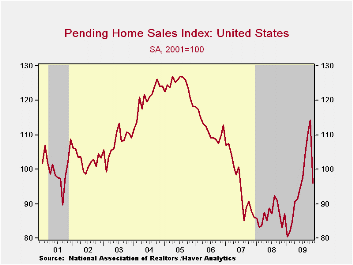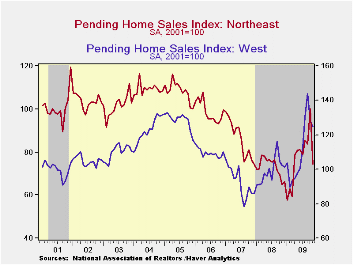 Global| Jan 05 2010
Global| Jan 05 2010U.S. Pending Home Sales Decline
by:Tom Moeller
|in:Economy in Brief
Summary
Home sales suffered during November due to the (since-extended) expiration of an $8,000 first-time home buyers tax credit. The National Association of Realtors (NAR) reported that November pending home sales fell 16.0% from October [...]
 Home sales
suffered during November due to the (since-extended) expiration of an
$8,000 first-time home buyers tax credit. The National Association of
Realtors (NAR) reported that November pending home sales fell 16.0%
from October after nine consecutive months of firm gain. Despite the
m/m decline, sales remained up 19.4% from their January low. The
monthly decline exceeded Consensus expectations for a 3.1% m/m decline.
Home sales
suffered during November due to the (since-extended) expiration of an
$8,000 first-time home buyers tax credit. The National Association of
Realtors (NAR) reported that November pending home sales fell 16.0%
from October after nine consecutive months of firm gain. Despite the
m/m decline, sales remained up 19.4% from their January low. The
monthly decline exceeded Consensus expectations for a 3.1% m/m decline.
 Sales in the Northeast fell a sharp 25.7% m/m following a 19.9%
October increase. Sales in the Midwest also fell 25.7% but that
followed a lesser 12.3% October gain. Sales in the South fell 15.0%
after the 5.1% October increase while sales in the West fell 2.7% after
a 10.9% October decline.
Sales in the Northeast fell a sharp 25.7% m/m following a 19.9%
October increase. Sales in the Midwest also fell 25.7% but that
followed a lesser 12.3% October gain. Sales in the South fell 15.0%
after the 5.1% October increase while sales in the West fell 2.7% after
a 10.9% October decline.
These home sales figures are analogous to the new home sales data from the Commerce Department in that they measure existing home sales when the sales contract is signed, not at the time the sale is closed. The series dates back to 2001 and the data is available in Haver's PREALTOR database.
Why Are Banks Holding So Many Excess Reserves? from the Federal Reserve Bank of New York is available here .
| Pending Home Sales (2001=100) | November | October | September | Y/Y | 2008 | 2007 | 2006 |
|---|---|---|---|---|---|---|---|
| Total | 96.0 | 114.3 | 110.0 | 15.5% | 86.8 | 95.8 | 112.1 |
| Northeast | 74.4 | 100.2 | 83.6 | 14.8 | 73.1 | 85.9 | 98.9 |
| Midwest | 82.0 | 110.3 | 98.2 | 9.2 | 80.6 | 89.5 | 101.9 |
| South | 97.8 | 115.1 | 109.5 | 14.8 | 89.6 | 107.3 | 127.2 |
| West | 124.6 | 128.1 | 143.8 | 21.4 | 99.5 | 92.3 | 109.6 |
Tom Moeller
AuthorMore in Author Profile »Prior to joining Haver Analytics in 2000, Mr. Moeller worked as the Economist at Chancellor Capital Management from 1985 to 1999. There, he developed comprehensive economic forecasts and interpreted economic data for equity and fixed income portfolio managers. Also at Chancellor, Mr. Moeller worked as an equity analyst and was responsible for researching and rating companies in the economically sensitive automobile and housing industries for investment in Chancellor’s equity portfolio. Prior to joining Chancellor, Mr. Moeller was an Economist at Citibank from 1979 to 1984. He also analyzed pricing behavior in the metals industry for the Council on Wage and Price Stability in Washington, D.C. In 1999, Mr. Moeller received the award for most accurate forecast from the Forecasters' Club of New York. From 1990 to 1992 he was President of the New York Association for Business Economists. Mr. Moeller earned an M.B.A. in Finance from Fordham University, where he graduated in 1987. He holds a Bachelor of Arts in Economics from George Washington University.






